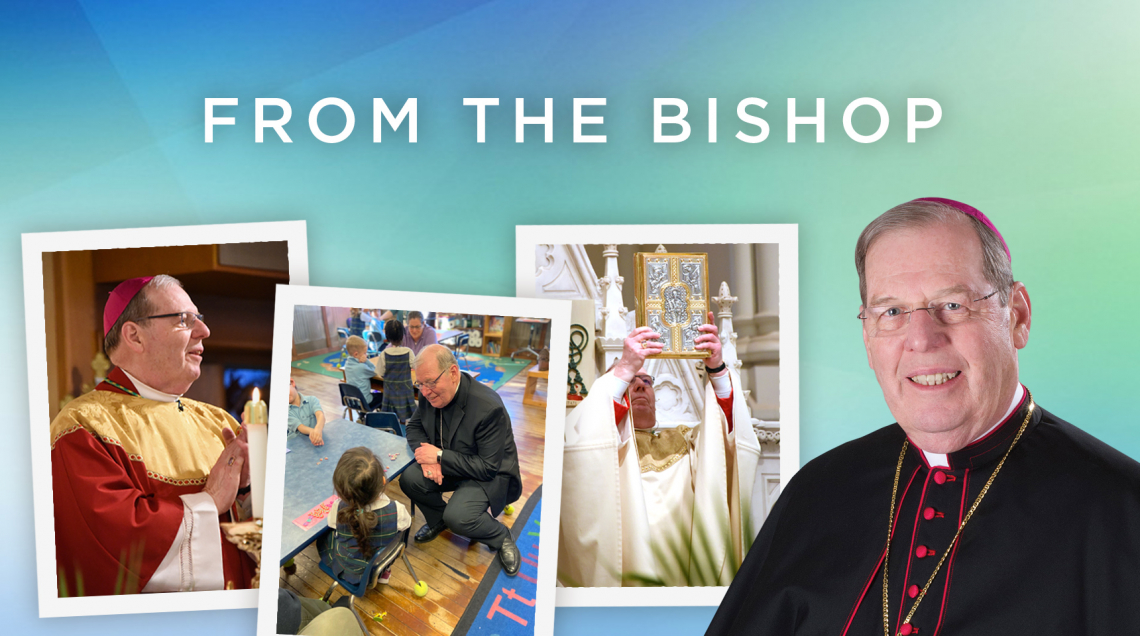From the Bishop - November 2020

On October 4, the feast of St. Francis of Assisi, Pope Francis published his new encyclical letter. The last one, you might recall, entitled Laudato Sí, dealt with climate and our relationship with the environment in which we live. In this new teaching, he addresses our relationship with each other. Pope Francis intends this letter to teach again “the message of Jesus encouraging us to recognize ourselves as brothers and sisters and to live accordingly in the common home that the Father entrusted to us.” The title comes from St. Francis, who proposed a way of life to his brothers and sisters (Fratelli tutti) grounded in the Gospel.
The Holy Father tells us that “human fraternity and social friendship have always been a concern” for him. He shares with us that he was writing this encyclical already when the COVID-19 pandemic erupted on the world. That terrible catastrophe exposed “our false securities.”
“For all our hyper-connectivity, we witnessed a fragmentation that made it more difficult to resolve problems that affect us all,” Pope Francis writes, offering this letter in the hope that “by acknowledging the dignity of each human person, we can contribute to the rebirth of a universal aspiration to fraternity.”
Like any other encyclical letter, this one will not be summarized in one column. It is a sweeping work encompassing a wide range of topics. Archbishop José Gomez, president of the United States Bishops’ Conference, describes the encyclical as “profound and beautiful.” It reminds us that “God our father has created every human being with equal sanctity and dignity, equal rights and duties, and our Creator calls us to form a single human family in which we live as brothers and sisters. God's plan for humanity, the pope reminds us, has implications for every aspect of our lives -- from how we treat one another in our personal relationships, to how we organize and operate our societies and economies."
It is comprehensive, but Pope Francis shows his keen attentiveness to the details of human relationship as he encourages young people to listen to their grandparents as they describe their struggles and attainments. Such knowledge connects the young with their culture and helps them to appreciate “the spiritual and human riches inherited from past generations.” Francis moves on, then, to discuss the pressing problems of the world. In his encouragement to our young people, he is pointing out that solutions to our difficulties begin in our own hearts. Problems with immigration, racism, poverty, political manipulation -- these are the result of a failure to acknowledge the humanity in those who share the world with us.
Pope Francis calls these problems the “dark clouds.” But our culture also contains “many new paths of hope.” To emphasize that God continues to sow abundant seeds of goodness in our human family, the pope speaks of the example of those who, in the midst of this pandemic, have put their lives on the line for others. “We began to realize that our lives are interwoven with and sustained by ordinary people: doctors, nurses, pharmacists, storekeepers and supermarket workers, cleaning personnel, caretakers, transport workers, public safety workers, priests, religious…they understood that no one is saved alone.” These are the people who show us hope in darkness.
The pope offers us the parable of the good Samaritan from the Gospel as a ray of light in the darkness and a sure way to move forward. The parable tells of the abandoned traveler lying injured on the road. Only one person, the Samaritan, stopped and cared for the injured. He did it personally, spending his own money and giving the man his time. The sickness of our society is tempted to ignore others and to look the other way when it encounters suffering or pain. Pope Francis summons us to be builders of a social bond that is aware that the existence of each and every individual is deeply tied to that of others. We are called to form a community of men and women who see themselves as neighbors, lifting up and rehabilitating the fallen for the sake of the common good. The parable of the good Samaritan can show us the way to judge every economic, political, social and religious project. Jesus calls us to be neighbors to everyone. Such a commitment flows from our conviction of the inalienable dignity of each person. It is what calls us to love and accept all persons as brothers and sisters.
There is much that will challenge us in this encyclical. Pope Francis, for example, condemns the use of the death penalty. He questions whether we can speak any longer of a “just war. These are, of course, serious issues. We do well to reflect deeply on his opinions.
The encyclical also deals critically with more daily matters such as our use of social media: “Even in Catholic media, defamation and slander can become commonplace, and respect for the good name of others can be abandoned.” Pope Francis asks, “How can this contribute to the fraternity that our common Father asks of us?”
The encyclical includes some 43,000 words. I suggest we commit to reading it, praying over it, and reflecting on the challenge it puts before us to respond to the world’s desire for fraternity, starting with the recognition that we are Fratelli tutti, brothers and sisters all.
God bless you,
Bishop Deeley










